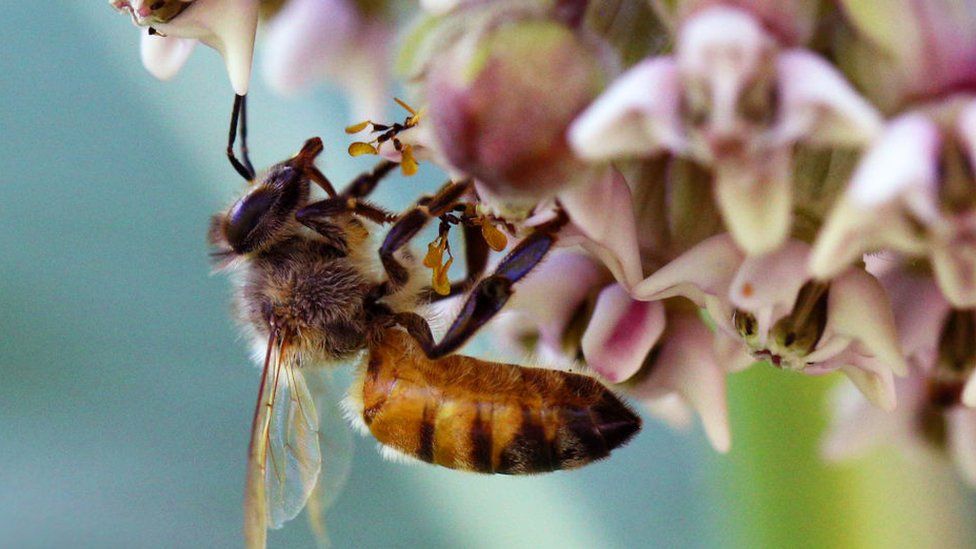Study suggests shortened lifespans for bees
- Published
- comments

A new study says that honeybee lifespans have halved in the last 50 years.
The report was based on findings of captive honeybee colonies in lab tests in the US.
Captive means they were kept by people, and not completely free in the wild.
Scientists have used caged bees in controlled lab tests since the 1970's and have noticed a decrease in lifespan.
They found that on average a worker bee's adult life in a lab environment has dropped from 34.3 days to 17.7 days
It's not really clear what factors could be affecting the decline in lifespan
Until now, studies have focused on environmental factors leading to the loss of bee populations. Things like pesticides on crops, parasites or natural diseases.
But since these are lab-based tests its thought the cause could be in the bees genetic code - characteristics of a bee passed on or inherited.
And if scientists can work out how a bee's genes are affected, they could work out ways to prevent disease in the species.
Bees play a critical role in the natural world, so if it can be understood where and why species are threatened its thought we can then do more to help populations recover.
WHY ARE BEES IMPORTANT?
- Bees are extremely important creatures! They help to provide a lot of the food that you eat - and we're not just talking about honey. Bees help to grow fruit and vegetables by flying around and pollinating plants.
How was the experiment carried out?
While it remains unclear why the bees have shorter lifespans, these lab results reflected what beekeepers have noticed around the country. So what's being represented in the lab is also being seen 'in the wild' too.
We're isolating bees from the colony life just before they emerge as adults, so whatever is reducing their lifespan is happening before that point
Anthony Nearman, Study author, Scientific Reports
To achieve these results the scientists reared adult bees in the lab. They did so in the same way previous studies have, by removing bee pupae from bee hive colonies before they are about to emerge as fully-formed bees.
They were kept in incubators to form as adult bees, but kept in the lab - this keeps them in a controlled environment in which to study them.
In the same controlled conditions as previous studies, the bees were fed their normal diet of sugar water - but the authors noticed that despite this evenly balanced supplemented diet the bees were only living half as long as older studies.
Conditions for lab-testing bees has improved over time, but the bees are not living as long. Researchers found this unusual.
Although having captive bees in a lab is different to those in a colony, over the last 50 years lifespans have been fairly similar compared with those in the wild, with beekeepers in the US reporting a drop in their colony numbers too.
The authors of the study think that the bees must be affected by something happening in the larvae stage - the part of their early life before they're extracted from the hive and before they emerge as adults - this short time frame is when they're being fed by worker bees returning to the hive.
They can't rule out the possibility that these bees may have been affected by pesticides at a super-early stage, where something is being passed to the larvae as they are developing, but the study showed no obvious symptoms of such exposure.
Researchers want to continue their study into honeybee lifespans across the US and other continents to see if they can spot any differences in the lifespan of other honeybee populations.
Those that are living longer might have stronger genetic traits and be less vulnerable to certain pesticides or diseases, so it might be possible to work out what factors these are and isolate them so we can better protect the species in the future.
The findings might also help scientists breed longer-living bees in the future - but for the time being this research provides further understanding between the possible relationships between environmental factors and bee genetics, and goes someway to explore how bee populations could be affected by something other than environmental pressures, of which we know far more.
- Published29 April 2020
- Published19 May 2020
- Published30 October 2022
